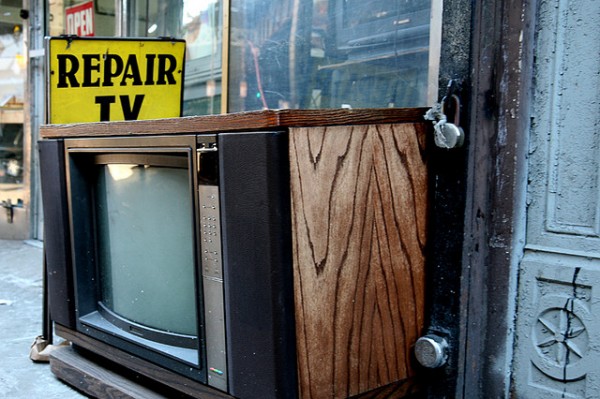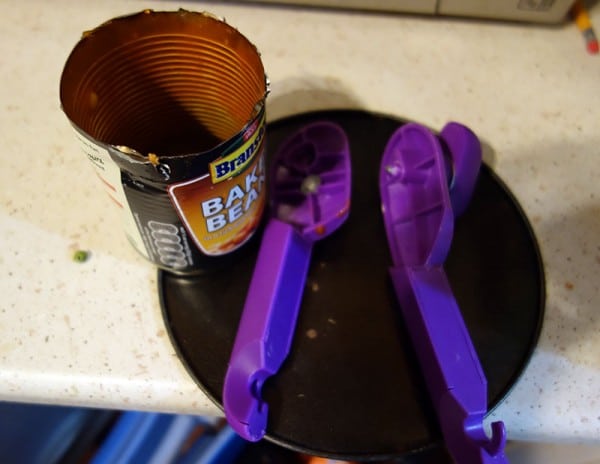The throw-away economy refers to the prevalence of consumer goods which only last for a short period of time. When they stop working / no longer relevant, we throw them away and replace them with new goods.
This is in contrast to an economy where resources are more scare – and if a good is purchased, we expect to make it last a considerable time – repairing if necessary.
For example, in the past, if our socks had a hole, we would sew them up (‘darning’ your socks). But, these days, if socks get a hole, it is more convenient to throw them away and buy some cheap socks instead.
If average wages are £10 an hour. Why spend 30 minutes sewing your socks, when you can buy a new pair for £3? In the past, wages were much lower compared to prices. If you only earnt £1 an hour, then it is worth sewing your socks to save buying a new pair for £3.
Therefore, rising real wages make a throw-away economy more likely.
Repair shops

In the past, there were many TV repair shops – if your tv or electronic goods broke down, you would try to have them fixed. In today’s world, if a TV broke down, we would be liable to throw away the TV and buy a new one. It is not so expensive and electronic goods are always offering new features. After a couple of years, your electronic goods can feel ‘outdated’ pretty quick. I have a stack of CDs I don’t play in CD players any more.
The problem of the tin openers

The inspiration for this post has been the number of tin-openers we have got through in the past 12 months. We have bought four tin openers, all of which have ceased working after a short period of use. In each case, we have thrown it away and bought a new one. The first two were from Sainsburys and Asda. They cost about £4 and looked fairly robust. But, after a few weeks, they stopped working properly, and then failed completely. My lodger uses the tin-opener most, so I told him since I paid £5 for a tin-opener and it stopped working, he might as well go get one from a Pound shop. The first tin opener did open one can of Heinz soup then it snapped. 99p to open one tin! That is called a false economy!
He took it back to the 99p shop and the workers laughed. They obviously got returned tin openers all the time. He got a replacement, but that broke straight-away, even before opening a tin.
Recently I wrote a post on the economics of Pound Shops.
Pound shops have many benefits – primarily low prices, good value, exploiting economies of scale and even making a contribution to a lower inflation rate. However, they do have their drawbacks. Focusing on low price can lead to low quality. It creates a throw-away economy. A situation where if something breaks, we just throw it away and buy a new one.
We can put a man on the moon, and perform micro-heart surgery, but there’s nowhere to buy a tin-opener which will reliably work. This is the throw-away economy.
Costs of the Throwaway economy
Environmental costs. Rather than have one pan which lasts for a long time, we may keep buying new ones every couple of years. This is an environmental cost – use of scarce resources and additional transport. Thus there are external costs of a throw-away economy. We pay £1 for goods, but because we ‘over-consume’ we are using more environmental resources than necessary.
- Disposed of goods can cause toxins to be released into the economy. For example, old TV’s with a
- Lost precious metals. The EPA say that for every million mobiles phones recycled they can gain, 35 thousand pounds of copper, 772 pounds of silver, 75 pounds of gold and 33 pounds of palladium. But, only 22% of mobile phones are recycled so all these precious metals are lost.
- All goods have a carbon impact – of production and transport. If we use one-time goods, we are adding to the carbon footprint and contributing to global warming.
- Many single-use goods make high use of plastic. Plastic pollution in increasingly recognised as a problem because it doesn’t biodegrade.
Low-quality goods. A throw-away economy encourages firms to produce low-quality goods. In the past, if something broke, we would be more liable to complain. These days, it’s easier to just throw it away and buy a new one. I haven’t made a formal complaint about any of the four broken tin-openers because what’s the point in quibbling over a £1-£4 tin opener? For firms, there are no incentives to produce a really reliable tin-opener for £10, because it is hard to sell a tin-opener on the basis it is guaranteed for 40+ years. Low prices are easy to see. Long-lasting durability is not easy to see. So the incentive for firms is to produce goods which are cheap and cheerful.
Encourages laziness. Rather than do the washing up, we buy disposable cups and plates, creating additional landfill sites.
We don’t value goods. My Grandmother’s kitchen was amazing. Everything in it, she had owned for 50 years. Pans lasted 50 years, cups, saucers everything! She really took care of all her items. She was brought up in an era when the idea of a throw-away economy didn’t exist. But, this care for her own goods, to make them last was quite touching – something lost on the modern generation. This isn’t just nostalgia. And my grandmother’s tin-opener always worked!
Pareto inefficiency. A throwaway economy has long-run inefficiencies. We use precious metals and non-renewable resources which will have increased costs in the future.
Benefits of a throw-away economy
- It encourages mass-production and economies of scale. It can be cheaper to produce new goods than repair them
- Throwing away our mobile phone after 2-3 years, enables us to get a new model with more features.
- Cheap goods make them more affordable for many people
- You can still try to repair goods if you want to.
Related

I am glad you wrote this article. It is very interesting.